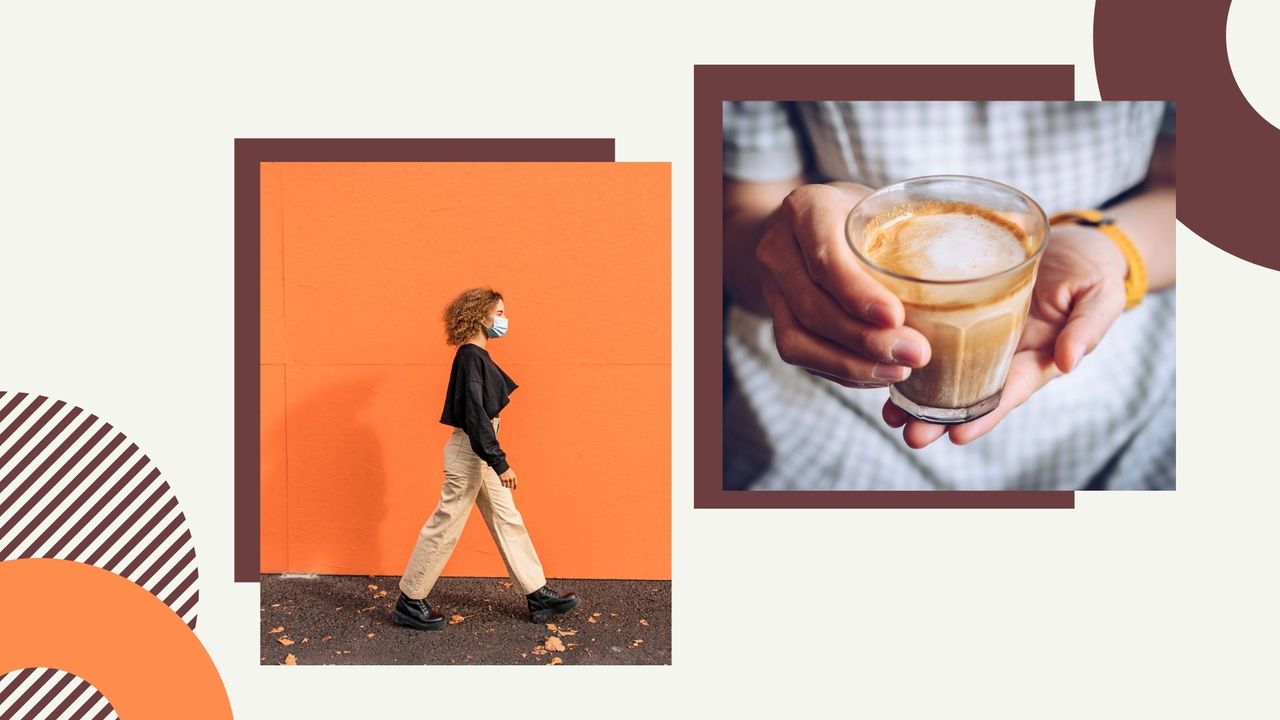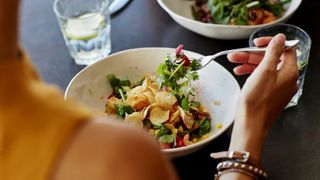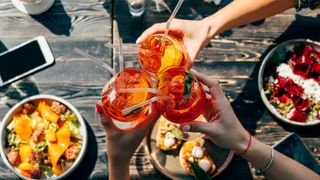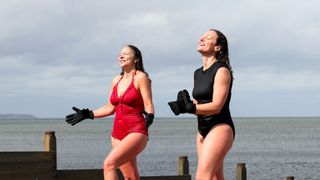The 9 biggest wellness trends of 2022 so far: From LISS to mushroom coffee
The wellness trends for 2022 are here. Experts weigh in on the biggest additions to the worlds of nutrition, fitness, sleep and sex this year


All the best wellness trends for 2022 are here, carefully handpicked by experts across the worlds of nutrition, fitness, sleep, and sex, to determine what’s hot when it comes to feeling good both inside and out.
It’s fair to say we’re owed a few more good moods this year. While we thought the pandemic was 2020’s defining feature, a potent combination of new variants and slow vaccine uptake around the world meant our lives remained much the same last year with many of us stuck with socially-distanced walks and stress-induced self-care to pass the time.
So what’s to be expected from 2022? From personalized nutrition to the latest sex trends 2022, this year’s wellness trends are taking things up a level.
Wellness trends 2022, as selected by health and wellbeing experts
In 2022, the biggest wellness trends are all about living bigger, better, and for longer by going back to basics. “In recent years, accelerated by Covid-19, the wellness industry has boomed with consumer focuses switching towards holistic wellbeing and preventative products,” explains Katy Cottam, founder of Luna Daily. “This has led to the significant growth of natural, science-backed solutions across personal care.”
While the wellness industry hit a record-breaking £1.5 trillion this year, with the sale of fitness kits and the best sleep aids seeing an all-time high post-pandemic, the focus has undoubtedly shifted. Already this year, we’ve seen one particular nutrient taking center stage, HIIT training taking a back step and even daily vitamins have had a makeover.
1. Toxic relationships with calories come to an end
Well, that might be a little too optimistic. While diet culture is still as pervasive and damaging as ever, shown by the UK government's recent decision to put calories on menus in England, the lean towards intuitive eating is now more of a lunge.
Intuitive eating is linked to a set of nutritional principles that are based on physical cues around food, like hunger and satiety, rather than numerical ones. It's all about how you feel and what your body needs, instead of relying on data like calorie figures.
Sign up for the woman&home newsletter
Sign up to our free daily email for the latest royal and entertainment news, interesting opinion, expert advice on styling and beauty trends, and no-nonsense guides to the health and wellness questions you want answered.

It's an approach that's over 15 years old but until recently, it had only existed as a restriction-free alternative to dieting. Amongst the restriction-heavy approaches being bombarded at us all the time, intuitive eating barely came through as a viable option.
But a combination of more awareness around the toxicity of diet culture and new research has culminated in a noticeable switch this year. For instance, a 2022 study by Northeastern University and a late 2021 review from Deakin University positively linked intuitive eating with more positive psychological benefits like increased positive body image, self-esteem and wellbeing when compared with traditional diets, across almost 100 studies.
Further research from the latest International Food Information Council (IFIC) survey suggests that half of Americans have eating patterns linked to mindful or intuitive eating.
So while it's fair to say that while the battle might not be won just yet, the move towards changing the way we think about eating suggests we're heading in the right direction.
2. High-protein focus
For keen gym-goers through to Olympic athletes, protein has always been a focus. But for the average person, it’s always been a macronutrient at the back of the mind. Carbs have been demonized and fiber promoted as the ‘cure all’ over the years while protein has barely got a look in—until now.
The benefits of protein as a satiating macronutrient have hit the mainstream and now, the likes of Mars are presenting an alternative way to enjoy chocolate with ‘hi-protein’ versions of staples like Mars Bar, Bounty, Twix and Maltesers. All of the bars boast an impressive 22g of protein, matching up to or surpassing some of the legacy best protein powder brands out there like myprotein and phD, along with newcomers to the market like Bulk and Misfits.
But be warned, while we’re likely to see plenty more brands pivot to high-protein, this trend isn’t quite all it's cracked up to be. While it appears to be a move in the right direction (eat what you enjoy but have 'heathy chocolate'), psychotherapist and nutritionist at The Food Therapy Clinic, Uxshely Carcamo, warns that although “our body does need protein in sufficient quantities, the amount we need is often overestimated by many.”
Also, while toxic relationships with calories and a new intuitive mindset may be 2022’s biggest win, diet culture is still very much here to stay. “Diet culture is so rampant and many people are often trying to lose weight,” Uxshely says, “So this could be where the excessive focus on protein consumption has come in as well.”
3. Mushroom coffee
Coffee trends, much like many others, tend to come and go with flat whites and cappuccinos swapping popularity places every couple of years. But a walk through some of the most famous coffee festivals in the world, including London Coffee Festival earlier this year, will tell you that there’s a shroom boom coming.
“Medicinal mushrooms are mushrooms with therapeutic properties that have been used in traditional medicine for thousands of years, though not the psychedelic kind,” explains Clarissa Berry, nutritionist for DIRTEA. “Mushrooms like Chaga, Reishi, Lion’s Mane, and Cordyceps are packed with beneficial molecules that help increase resilience to stress, offer antioxidant protection, enhance energy levels, regulate mood, sharpen focus, and much more.”
If you're picturing mushrooms floating on top of your americano, don't worry, that's not what mushroom coffee is about. Available everywhere from Amazon to smaller retailers like DIRTEA themselves, this blend grinds mushrooms and coffee beans together to create a nutty and rich flavor, perfect for those with a strong palette.
While it might not be to everyone’s taste, at a time when stress is still a common factor in many of our lives, the need for a little something extra with our morning stimulant seems to be higher than ever —just have a look at the CBD coffees of years gone by.
“Relying too heavily on caffeine and other stimulants for alertness, and often using alcohol to wind down in the evening, places a huge strain on the body,” Clarissa adds. “Mushroom coffee, or even pure mushroom powders like Cordyceps, provide a natural, balanced energy boost without jitters and with a whole lot of other health benefits,” Clarissa says.
A post shared by DIRTEA (@dirteaworld)
A photo posted by on
4. Glucose tracking
We’ve counted our steps, hours spent asleep, and stress levels. Now, in 2022 we’ll be measuring our glucose levels with devices traditionally reserved for professional athletes and those with diabetes.
“Glucose is a main source of fuel for the body during intense exercise, and the only one an athlete can control—through eating. Yet before Supersapiens, there was no commercially available way for athletes to know exactly how well-fueled they are at any given time, or exactly when they should eat for sustaining their peak performance,” explains Kristina Skroce, sports physiologist and Supersapiens’ experimental learning and scientific support.
“Up until now, fueling and energy management have been a guessing game. As athletes, we measure and optimize every possible variable—power, heart rate, speed, and sleep. But, to date, we haven’t had the technology to access potentially the most key variable for athletic performance: real-time glucose visibility.”
It's a simple setup that you can do from home. The performance patch contains a biosensor, which streams your glucose data to the Supersapiens app. This stays on your arm for two weeks then you swap it out for another, while the app allows you to analyze your levels and corresponding performance in real-time.
While Supersapiens, and other glucose tracking software, were initially designed for high-performance athletes, the technology making its breakthrough to the mass market in 2022 certainly has its advantages. "Instead of wasted training sessions where you have dead legs, zero energy, or are totally exhausted for the rest of the day, you can maximize each workout by showing up properly fueled and able to train at your threshold. Over time, this helps you improve your overall athletic performance," Kristina says.
But along with do-it-yourself glucose tracking, the ultimate step-up from your standard fitness tracker, it’s out with the standard weigh-in when you join a gym and in with a more advanced level of monitoring. Luxury gyms around the world are also offering the service as part of the join-up process. Take KX in Chelsea, where monthly membership comes in at an eye-watering £615 per month, who offer glucose monitoring in their wellness assessments for all new members.
5. More mindful drinking
Dry January may be long gone but the desire for low, or no-alcohol drinks, is certainly here to stay. It might be a surprising one, considering the huge increase in casual binge drinking during the pandemic, as found by Massachusetts General Hospital, but it was this (wait for it) unprecedented time that led to a change in habits this year.
“No- and low-alcohol spirits are growing rapidly with health and wellbeing the key driver of this growth,” explains Daniella Schoeman, master distiller of alcohol-free spirit Mahala Botanical. “From what we’ve seen, this was further exacerbated by the pandemic, with a growing awareness and accountability for own personal health and wellness.”

But while alcohol-free beers like Beck's Blue have existed for years, they've been reserved exclusively for those taking part in a booze-free month or unable to drink. Now, a new generation of low- or zero-alcohol drinks has taken over the market—and made it better than ever. Brands like Lucky Saint, Seedlip, and Mahala have undoubtedly led the mindful drinking charge and now, finally, we’re seeing giants like Gordons and Guinness playing catch up.
While London, which is home to thousands of pubs, got its very first alcohol-free off-license earlier this year. The Offy, created by Club Soda founder Laura Willoughby, opened at the very end of last year and until March 2022, offered shoppers their pick of the hundreds of no- and low-alcohol brands out there.
And the trend is only going to grow, predicts master distiller Daniella. “While such drinks are well established in the retail environment, we’re now seeing growth in bars and restaurants too. Attitudes have changed and it is far more socially acceptable to abstain from drinking alcohol than it was before – and, with so many more having now experienced no-and-low alcohol options, consumers are more familiar with the brands and less hesitant to now ask for one,” she says.
6. Sleep hygiene taken seriously
Talking about sleep, its importance, and how to sleep better is certainly not new but in 2022, we’re taking sleep hygiene seriously. According to luxury CBD brand OTO’s research, a staggering 86% of us experience insomnia, and over half of us would call ourselves ‘bad sleepers’. That's got to change in 2022, which means putting ourselves in the right mindset and position to get the best night’s sleep possible. That could be doing a full Sunday reset or just getting into bed at the right time in the evening.
“When it comes to sleep, creating a good environment is the foundation for all positive sleep patterns,” explains sleep expert James Wilson, so it's no surprise that we're thinking about it more this year. “If the environment is right, you are not only more likely to get more sleep, but more quality sleep that restores you for longer. Both a drop in heart rate and core temperature are key to getting quality shut-eye, and setting the right environment plays a pivotal role in preparing your body to feel safe and secure before drifting off.”
And with this in mind, it's no surprise that brands are focusing on magnesium-based products for the year ahead, as just one of the benefits of magnesium is its ability to help us drift off. Brands like Neom have gone from magnesium-infused body butter exclusively for sleep to supplementing the mineral across the whole range, while Puresport includes now magnesium in one of their newly-launched ranges.
7. LISS to rival HIIT
Claudia Schiffer and Pippa Middleton are reportedly firm fans but what’s the big deal about low-intensity steady-state training, otherwise known as LISS cardio? As well as avoiding the risks of injury that come with high-intensity training like running or HIIT treadmill workouts, new studies from CHA University have shown that low-intensity exercise is equally as effective as its bouncier counterpart.
Set apart from high-intensity interval training (HIIT), LISS is cardio-based exercise where you do an activity at a low-to-moderate intensity for a continuous, and often longer, period of time. It often includes all the classics like running, cycling, swimming and walking. The same study, published just last year, highlights that LISS is just all-round suitable for more people, including those who are pregnant, just starting with exercise, older adults, and even cardiac patients for this reason, as it's exercise most people are used to, done with less chance of injury.

While the best exercise will always be the one that you stick to, says Emily Servante, certified personal trainer and global trainer education manager at Ultimate Performance, there are so many other benefits to LISS training.
“I would recommend that everyone, regardless of age or gender, should add LISS training to their daily routine if they want to stay fit and healthy,” she says. “For example, to break down fat, you need oxygen. When you do LISS at the right intensity, like 60 percent of your maximum heart rate for anything between 30 to 60 minutes, that means you’re not starving your body of the oxygen it needs to chip away at your excess fat store, and instead, your body will use your stored fat as fuel.”
Another reason why LISS has hit big on the wellness trends of 2022 is that we can do it with family and friends—unlike exercise in recent years. “How lovely is it to be able to meet up with friends in the outdoors and enjoy a walk or a bike ride in the fresh air?" says Emily. "It’s an aspect of exercise that all too often gets ignored to the detriment of good long-term lifestyle habits.”
8. Personalized nutrition
The move towards intuitive eating and hike in sales of personal fitness and sleep tracking devices shows us one thing about wellness trends in 2022: we’re going personal.
Personalized nutrition comes in the form of uniquely-made 'stacks', vials or pills, each one including the vitamins and minerals that you may need to improve your overall health, as determined by a quiz online. It's something that a standard multi-vitamin has been unable to offer. While you could take several vitamins, some of which you won't need, why not just take one filled with what you do?
While personalized supplements have been around for a few years, it's only in the last one that they've hit the mainstream with the likes of Nourished, Vitl, Personalised Co. and Vitamin Buddy all stepping up to offer tailor-made vitamins via post.
“Since Covid, an increasing number of people have become more aware of their body’s overall health and are seeking a more customized approach to vitamin consumption to help them overcome any challenges they may face,” Melissa Snover, nutritionist, founder, and CEO of Nourished, says.
Our lives are busier than ever post-Covid and we've all seen the impact that staying healthy can have, both on our mental and physical wellbeing, but as Melissa points out, " we all have busy lives and it takes commitment to maintain our health."
She says, "Most people would admit it's tough to remember to take even one vitamin a day, let alone seven. Simply put, it's the smartest way to consume supplements."
A post shared by Nourished (@get_nourished)
A photo posted by on
9. Ditching embarrassment around intimate care
When it comes to trends around sex, we’ve seen everything from a huge increase in the best sex toys in 2022 to massive lifestyle changes post-pandemic and new language like zombieing, allowing for entirely new conversations around sex positivity to form.
Skincare and haircare categories have followed to reflect the need for honest conversations in these spaces, reducing stigma around certain conditions like alopecia and changing what ‘normal’ really means.
“Yet there’s one very important part, arguably the most important part of the female anatomy which has been left behind in this conversation,” Katy, founder of Luna Daily, suggests. “The vulva.”
This is one that we’re hoping to see a change in over the next year. She says, “Engulfed by a category still shrouded in embarrassment and confusion, with a selection of synthetic products focusing on one-size-fits-all so-called problem solutions that many women hide in a bathroom cupboard.”
It’s a problem with real-world impact, she explains. A recent YouGov survey found that half of Brits can’t pinpoint their vagina and Luna Daily’s own research found that among 1000 women of all ages, 80% could not accurately name their vulva, with one in three washing inside their vagina—leading to serious gynae issues.
“What’s worse is one in three women are also missing their cervical smears out of embarrassment,” Katy says, highlighting the need for shame around caring for intimate areas to end.

Grace Walsh is woman&home's Health Channel Editor, working across the areas of fitness, nutrition, sleep, mental health, relationships, and sex. She is also a qualified fitness instructor. In 2025, she will be taking on her third marathon in Brighton, completing her first ultra marathon, and qualifying as a certified personal trainer and nutrition coach.
A digital journalist with over seven years experience as a writer and editor for UK publications, Grace has covered (almost) everything in the world of health and wellbeing with bylines in Cosmopolitan, Red, The i Paper, GoodtoKnow, and more.
-
 The White Company's Hypoallergenic Mattress Topper is surprisingly affordable and a dream to sleep on
The White Company's Hypoallergenic Mattress Topper is surprisingly affordable and a dream to sleep onThe The White Company Hypoallergenic Comfort Topper offers a gentle, supportive layer to your sleep set-up for a surprisingly affordable price.
By Laura Honey Published
-
 Gwyneth Paltrow’s classic pinstripe pyjamas will keep you cool and comfortable on warm nights
Gwyneth Paltrow’s classic pinstripe pyjamas will keep you cool and comfortable on warm nightsChic and comfortable? Her stylish pyjama set is our new go-to
By Charlie Elizabeth Culverhouse Published